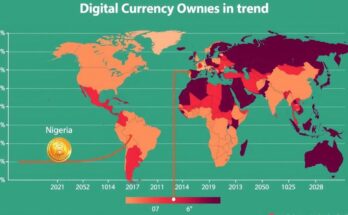Nigeria has lifted a five-year ban on mining in Zamfara State due to improved security. Minister Dele Alake stated that reduced insecurity would allow the mining sector to contribute significantly to the economy. The government aims to diversify from oil dependency, implementing reforms to attract investment and collaborating internationally for capacity building.
Nigeria has officially lifted a five-year ban on mining operations in Zamfara State, attributed to significant improvements in security conditions. This development was confirmed by Dele Alake, the Minister of Mines and Steel Development, who emphasized that enhanced security efforts have mitigated the threats posed by banditry. Mining activities in Zamfara, which is rich in gold, lithium, and copper, had been suspended since 2019 due to persistent violence that disrupted operations.
Minister Alake stated, “The security operatives’ giant strides have led to a notable reduction in the level of insecurity, and with the ban on exploration lifted, Zamfara’s mining sector can gradually begin contributing to the nation’s revenue pool.” He further observed that during the hiatus, illegal mining practices had proliferated, resulting in the exploitation of the state’s mineral resources.
As Africa’s largest oil producer, Nigeria aims to bolster its mining sector, which currently accounts for less than 1% of its GDP. The government is keen to diversify the economy and reduce its dependence on oil. To attract investment, Nigeria has implemented various reforms, including the revocation of unused licenses, the provision of a 75% stake in a new national mining company for investors, the restriction of unprocessed mineral exports, and stringent measures against illegal mining.
Moreover, Nigeria has signed a training and development agreement with France to enhance its mining capacities. Alake noted, “We need all the support we can get, including technical, financial, and capacity-building assistance from abroad. This is not the first agreement of its kind; similar partnerships have been established with Germany and Australia.”
The recent decision by Nigeria to resume mining in Zamfara State follows a five-year suspension due to severe security issues, particularly banditry. Zamfara is known for its abundance of mineral resources, including gold, lithium, and copper, yet these deposits have remained largely untapped during the ban. With the lifting of the ban, the Nigerian government seeks to improve its mining sector’s contribution to the national economy, especially as efforts intensify to reduce dependence on oil revenues through economic diversification. Considering the relatively small contribution of mining to Nigeria’s GDP, the government has recognized the importance of creating a more favorable environment for foreign and local investors. Various reforms and collaborative agreements with foreign nations aim to facilitate the growth of the mining sector, which has immense potential for revenue generation and employment opportunities.
The lifting of the mining exploration ban in Zamfara signifies a crucial step toward reviving Nigeria’s mining sector amid ongoing efforts to enhance security and attract investments. By implementing strategic reforms and fostering international partnerships, the Nigerian government aims to strengthen the economic viability of its mineral resources while addressing the challenges posed by illegal mining activities. This initiative is pivotal for the nation’s broader economic diversification strategy, aiming to expand beyond oil dependency.
Original Source: www.mining.com




